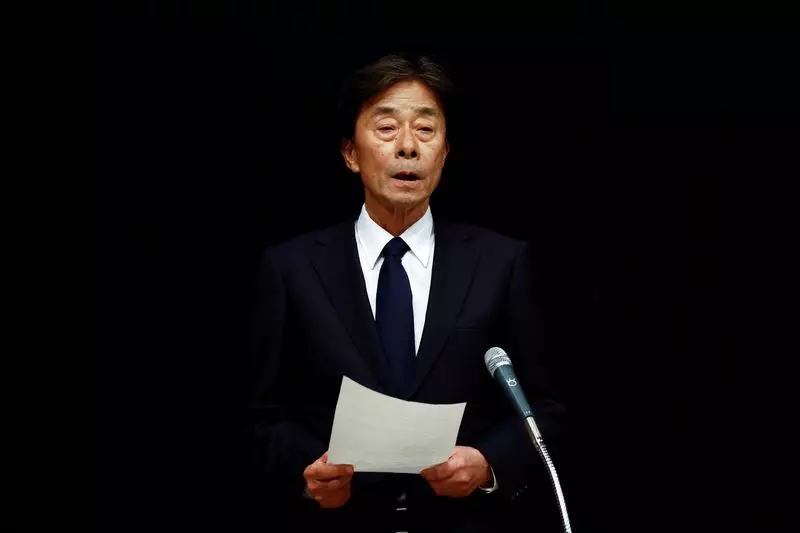Japan’s entertainment industry is currently engulfed in a scandal that has not only forced high-profile executives to resign but has also opened the floodgates to discussions about the systemic challenges faced by women within the sector. The Monday announcement from Fuji Media concerning the immediate resignation of Chairman Shuji Kanoh and TV unit head Koichi Minato—as a result of ongoing investigations into alleged sexual misconduct—has highlighted the fragile intersection of celebrity culture and corporate responsibility. Allegations against Masahiro Nakai, a well-known TV personality and former member of the illustrious boy band SMAP, have sparked outrage and a significant backlash from advertisers, showcasing the potential for reputational harm in the digital age.
The allegations surfaced last December through various Japanese tabloids, which accused Nakai of sexual misconduct. His long-standing tenure in the Japanese entertainment scene rendered these accusations all the more sensational. The public was drawn into the narrative that not only implicated Nakai but also suggested an unsettling environment where women were treated as expendable within the realm of entertainment. Reports indicated that an executive linked to Fuji Media went to great lengths to arrange a situation wherein female talents were allegedly placed in uncomfortable and vulnerable positions with male celebrities, raising alarm bells on the ethical practices operating behind the scenes in Japanese television.
The resignation of key figures in the company comes in response both to the growing public outrage and to financial repercussions stemming from major brands, such as Toyota and Kao, suspending their advertising with Fuji Media. This exodus serves as a powerful reminder of the influence that social consciousness can exert on business entities. While Fuji Media claimed to prioritize an immediate, independent review of the events that transpired, many stakeholders are skeptical about the sincerity of these efforts and whether they will lead to meaningful change in management and corporate governance.
Kanoh’s public apologies during a press conference reflected an attempt to contain the damage, but they may have missed the mark in addressing the wider cultural and operational issues at play. His acknowledgment of a lack of care in protecting individuals involved highlights a troubling trend where corporate image overshadows accountability, leaving the victims of such incidents feeling neglected and disempowered.
Activist investors have been particularly vocal regarding Fuji Media’s mishandling of the situation. Investment firms such as Dalton Investments and Zennor Asset Management are pressing for a thorough overhaul of business practices, fueled by demands for greater transparency and a change in leadership paradigms. Their dissatisfaction exemplifies a growing trend where financial interests align with social responsibility, urging companies to take a more progressive stance on ethical issues.
As a response to this scandal, companies may feel the need to adopt a higher standard of corporate governance, influenced by both internal and external pressures. The formation of a third-party committee, tasked with investigating the allegations, has been seen as a step in the right direction, but the effectiveness of such measures remains to be evaluated. As the committee prepares to release its findings by March, stakeholders will be closely watching for actionable insights and potential reforms to prevent similar incidents in the future.
This incident mirrors a much larger narrative within the cultural landscape of Japan, reminiscent of the global #MeToo movement. The past few years have been punctuated by revelations of sexual misconduct involving influential figures, shedding light on a culture that has often been dismissive of such claims. The recent dissolution of Johnny & Associates, a premiere talent agency, following allegations against its founder, further underscores the necessity for a cultural reform within the Japanese entertainment industry.
Moreover, recent accolades, such as the nomination of the documentary “Black Box Diaries” for an Academy Award, signify a growing commitment to exploring themes of justice and accountability. This reinvigorated dialogue surrounding women’s rights and protections sheds light on the need for societal change, signaling that the conversation is far from over.
The fallout from the Fuji Media scandal serves as both a cautionary tale and a catalyst for transformation within Japan’s deeply entrenched entertainment hierarchy. The consequences of these allegations remind us that the path to accountability is fraught with complexities, but it is essential for the reshaping of an industry that has long operated within a shroud of silence and complicity. As we move forward, the lessons from this incident could pave the way for a more equitable and respectful landscape for all participants in the entertainment sphere.

